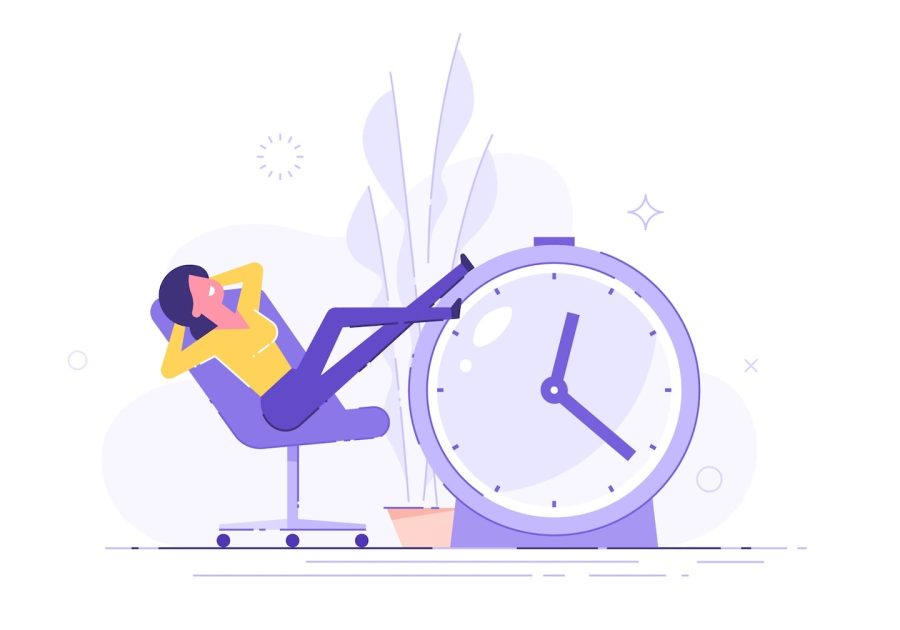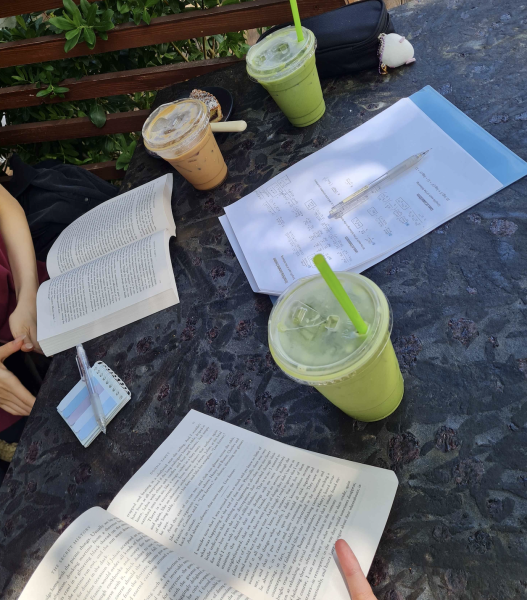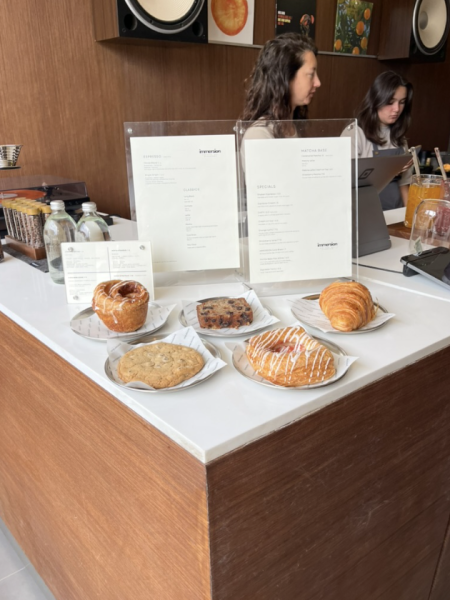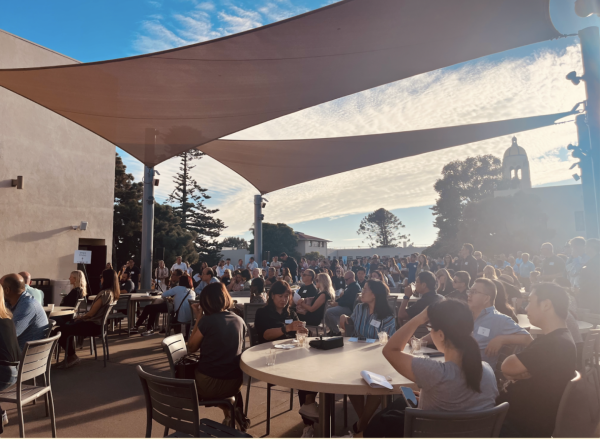The True Enemy: Procrastination
If procrastination hurts people so much, why do we do it?
Everyone dreads the list of purple tabs lined up on the assignments page of Blackbaud. Those “to-do’s” can pile up leading to one lab report, two essays, and one math assignment all due the next day. Next thing you know, you are overloaded with homework and staying up past 12:00 A.M.to finish it. How did this happen?
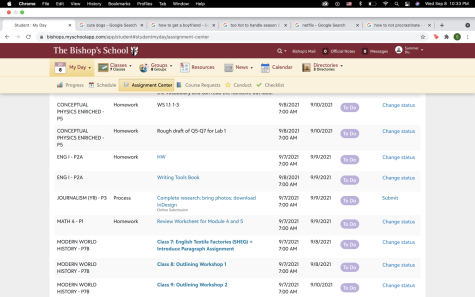
Studies done by Brookfield Research Chair at the Haskayne School of Business Dr. Piers Steel shed light on the widespreadness of procrastination. Steel’s article, “The Nature of Procrastination” reports that approximately 80%–95% of college students engage in procrastination to some degree.
However, procrastination can start even earlier: in high school or even elementary school. A survey done by SAT and ACT prep center, Magoosh, found that 86% of their high-school students procrastinate on assignments. Saavi Banerjee (‘22) also said that she has been procrastinating “since 5th grade.”
Of the seven students asked for their opinions on procrastination, all of them replied that they procrastinated. However, during the interview process, many did not want to talk about their habits or have their name be mentioned under the topic of procrastination.
The stigma that people who procrastinate are disorganized, lazy, or have a lack of time management is something that makes this topic hard to generate thoughtful conversation on. However, Dr. Tim Pychyl, a member of the Procrastination Research Group at Carleton University, has an opinion that can change how we view procrastination.
“Procrastination is an emotion regulation problem, not a time management problem,” he said. Pychyl thinks that people aren’t lazy or disorganized, but that something—an emotion or feeling—is preventing them from completing their task. Dr. Fuschia Sirois at the University of Sheffield also talked about these emotions and said that procrastination “has to do with an inability to manage negative moods around a certain task.”
What Sirois means is that people procrastinate tasks they don’t want to do or have negative feelings about. Sashi Chuckravanen (‘25) said, “I generally procrastinate on things I don’t understand…I hated writing persuasive essays, and I kept getting stuck collecting my evidence. I decided to put it off until later, and that later kinda became two nights before it was due.”
In contrast, people won’t wait to do something entertaining like scrolling endlessly through Youtube videos, hanging out with friends, or doing other productive tasks like cleaning to avoid doing the thing they don’t want to do. “When I procrastinate, I go on TikTok and scroll and refresh apps on my phone,” said Sophia Bao (‘25).
Professor of psychology, Mr. Joseph Ferrari, who teaches at DePaul University’s College of Science and Health, likes to categorize procrastinators into three types: the thrill-seekers, the avoiders, and the indecisives.
“A lot of nervous[ness] and anxiety builds up, along with stress…I have brief moments while I’m distracting myself that I have an immense amount of stress…then I suppress it.” The thrill-seekers enjoy the feeling of procrastinating and the rush of adrenaline from waiting until the last minute, so they procrastinate purposely. The avoiders often have negative feelings about the assignment and aren’t motivated to do the task. “I’m definitely an avoider. I see an assignment that looks super unappealing and I sort of just put it to the side for later… because it’s just not something I feel like doing at the moment,”Sashi said.
Lastly, the indecisives take so long to make a choice that they end up spending too much time thinking than doing the task. When interviewing for this article, all seven interviewees answered that they felt they fell into the ‘avoider’ category. There may be a reason behind that.
“Most people tend to give in to feel good,” Dr. Pychyl said in The Washington Post. In other words, people succumb to personal desires instead of being productive.
Many psychologists like Dr. Pychyl label this instant desire as hedonic pleasure. The opposite of hedonic pleasure is eudaimonic pleasure or happiness that comes from achieving challenging goals. However, the former is the most commonly felt.
When students procrastinate, they wait to do their assignments. However, the panic that comes with these actions can have an unhealthy impact on yourself. Staying up late and skipping lunch to do an assignment are all ways that panic can negatively impact your health. “I was staying up until 1 A.M. trying to do a theatre tech project…It was extremely stressful,” said Juni.
Unfortunately, the lack of motivation to complete assignments can turn into a vicious cycle. For Juni, even though he “feels a large amount of relief” after the assignment ends, the cycle of procrastination restarts once a new deadline comes near. Sophia said, “I feel temporary relief when I procrastinate, but the panic comes rushing in after some time.”
This panic is the reason why the majority of people feel stressed when procrastinating. The studies in Dr. Pierce Steel’s “The Nature of Procrastination’ stated that 94% of people said that procrastination has a negative effect on their happiness, and 18% said that this effect is extremely negative. The problems that lie within procrastination are the effects it has

on the mind.“A lot of nervous[ness] and anxiety builds up when I procrastinate, along with stress,” Juni explained.
However, there are some rare exceptions. Saavi does not feel stressed when procrastinating as she is “pretty used to it.” When asked why she procrastinates, she said, “I want to have a good time at home, and homework is not something that is fun for me.”
Although she may not feel the effects of procrastination, Saavi, along with many others‚ procrastinate for the same reason: lack of interest.
“The idea of sitting down and focusing is hard for me,” said Sophia. Before procrastinating, Oggie “really wants to sleep.” When asked about her thoughts on why she procrastinates, Saavi replied that she “likes doing a lot of stuff” and went on to explain that she would much rather be doing those things instead of homework.
In the end, procrastination lowers one’s overall happiness. “After procrastinating, I feel burnt out because I just crammed a bunch of homework into a few hours,” said Sophia.
There is still hope for procrastinators. Breaking large assignments into small chunks can help minimize the dread and stress that comes with them. Gradually doing your work and working ahead can also minimize stress and procrastination. Eudaimonic pleasure is something that you can feel if you don’t procrastinate and plan ahead. Additionally, having goals and achieving them can motivate you to achieve even more.
According to Ferrari’s research, forgiving yourself can also help end the vicious cycle of procrastination by clearing your mind of the negative feelings that procrastination originates from. However, don’t forgive and forget. Forgive yourself and you will feel the pleasure of the green “completed” tab on Blackbaud.

Summer is a senior and Editor-in-Chief of The Tower. This is her fourth year on the staff and third on the editorial team, previously serving as a story...


